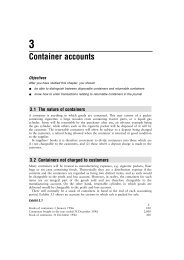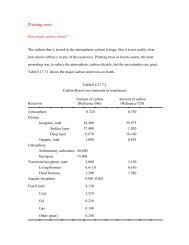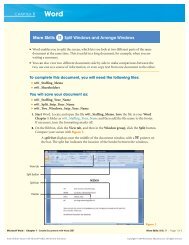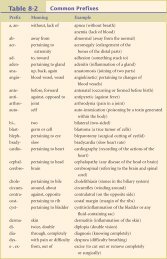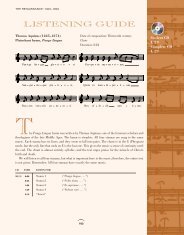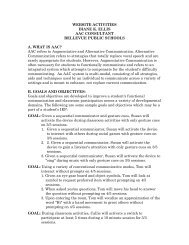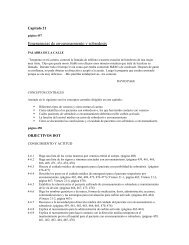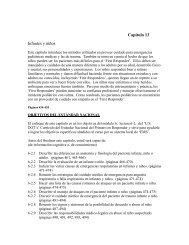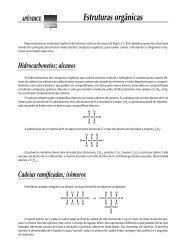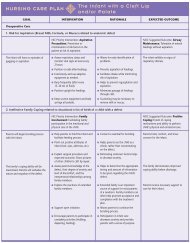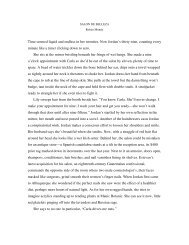French Verb Primer by Helene Gallier-Morgan Regular ... - Pearson
French Verb Primer by Helene Gallier-Morgan Regular ... - Pearson
French Verb Primer by Helene Gallier-Morgan Regular ... - Pearson
Create successful ePaper yourself
Turn your PDF publications into a flip-book with our unique Google optimized e-Paper software.
Ils vont le faire/They are going to do it<br />
REGULAR VERBS IN THE PRESENT SUBJUNCTIVE<br />
To conjugate a regular verb in the present subjunctive, use the stem of the first person plural of the present<br />
indicative, remove the -ons ending and add the following endings of the present subjunctive:<br />
e/es/e/ions/iez/ent<br />
Ex: connaître<br />
Present indicative: nous connaissons<br />
Present subjunctive : Je connaisse/Tu connaisses/Il, elle connaisse/Nous connaissions/Vous connaissiez/Ils,<br />
elles connaissent<br />
1. With verbs like 'appeler,' the 'l' is doubled between two mute 'e': appelle, appelles, appelle, appelions, appeliez,<br />
appellent.<br />
2. 'Y' is changed to 'i' before a mute 'e' and after the vowels 'o' or 'u.' Ex: voir Present indicative: nous voyons<br />
Present subjunctive: voie, voies, voie, voyions, voyiez, voient.<br />
Before a mute 'e' and after the vowel 'a,' 'y' can be retained or changed to 'i.' Ex: essayer Present indicative: nous<br />
essayons Present subjunctive: essaie, essaies, essaie, essayions, essayiez, essaient or: essaye, essayes, essaye,<br />
essayions, essayiez, essayent.<br />
3. With verbs having an 'i' at the end of the stem in the present indicative, there are two 'i' in the first and second<br />
persons plural of the present subjunctive. Ex: rire Present indicative: nous rions Present subjunctive: rie, ries, rie,<br />
riions, riiez, rient.<br />
4. With verbs containing a mute 'e,' an 'accent grave' is added whenever there is another mute 'e' in the next<br />
syllable. Ex: enlever Present indicative: nous enlevons Present subjunctive: enlève, enlèves, enlève, enlevions,<br />
enleviez, enlèvent.<br />
5. With verbs containing an 'é,' the 'accent aigu' is changed to an 'accent grave' whenever there is a mute 'e' in the<br />
next syllable. Ex: préférer: Present indicative: nous préférons Present subjunctive: préfère, préfères, préfère,<br />
préférions, préfériez, préfèrent.<br />
6. With verbs ending in -cer, the cedilla does not appear in the present subjunctive. Ex: commencer Present<br />
indicative: nous commençons Present subjunctive: commence, commences, commence, commencions,<br />
commenciez, commencent.<br />
7. When forming the subjunctive of verbs ending in -ger, remove the 'e' that was placed between the 'g' and<br />
the -ons ending in the present indicative. This 'e' never occurs in the present subjunctive. Ex: ranger Present<br />
indicative: nous rangeons Present subjunctive: range, ranges, range rangions, rangiez, rangent.<br />
IRREGULAR VERBS IN THE PRESENT SUBJUNCTIVE (1)<br />
aller: aille, ailles, aille, allions, alliez, aillent<br />
apercevoir: aperçoive, aperçoives, aperçoive, apercevions, aperceviez, aperçoivent<br />
apprendre: apprenne, apprennes, apprenne, apprenions, appreniez, apprennent<br />
Copyright © 2007 <strong>Pearson</strong> Education Canada<br />
10



